- Category
- War in Ukraine
Russian House, Moscow’s Global Propaganda Machine Disguised as a Humanitarian Organization
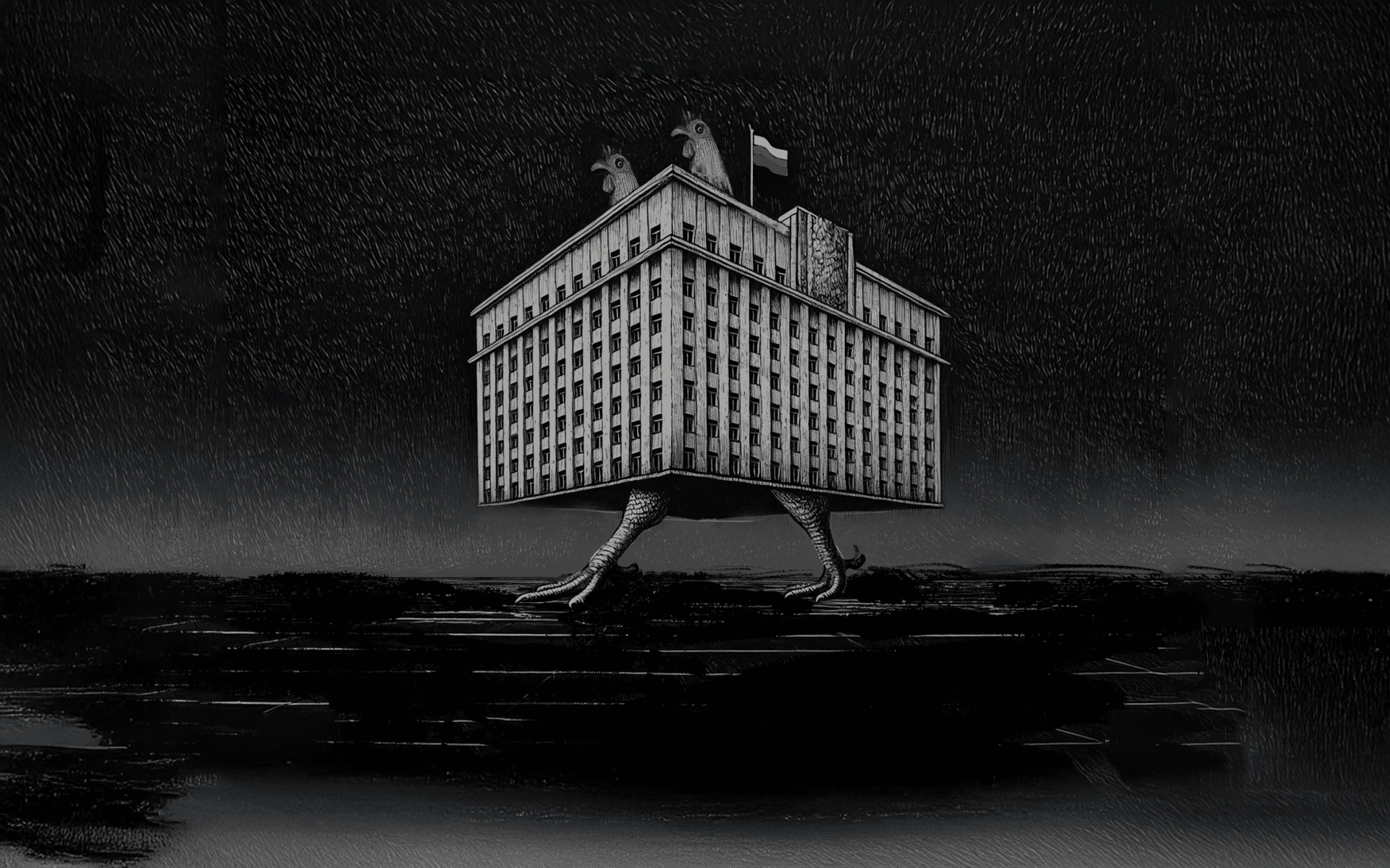
Sanctioned but still active, the Kremlin’s so-called “cultural humanitarian organization”—Russian House—remains a key tool of Moscow’s political subversion. Operating worldwide, it serves as a front for espionage, propaganda, and soft power, using art, culture, and educational programs to promote the “Russian world” while undermining Ukraine’s sovereignty and independence.
Azerbaijani authorities ordered the closure of the local branch of Rossotrudnichestvo , Azerbaijani media Report said on February 6, 2025.
“Azerbaijan itself has become a donor country and does not need assistance from abroad, especially when it is provided through opaque schemes and organizations clearly involved in intelligence gathering,” the Report stated, citing their “well-informed sources”.
Russian House is a Russian state-run global “humanitarian organization”, that experts say is a cover for spreading Russian propaganda. Formally, this organization is intended to promote cultural interaction between Russia and foreign countries, but it is used as an instrument of soft power and hybrid warfare.
“Russian Houses are places that remind our citizens of their homeland, providing them with up-to-date information on events in Russia” and allowing “those interested in Russian affairs to stay informed,” according to Anton Kobyakov, Russia’s Presidential advisor. “In this regard, the role of Russian Houses becomes especially significant.”
Rossotrudnichestvo and the Russian Houses organized by it are an important tool of the Kremlin’s influence abroad. Despite positioning itself as a cultural and apolitical organization, in reality, Rossotrudnichestvo is just a cover for spreading propaganda and disinformation operations.
Centre for Countering Disinformation
What is Russian House?
The Rossotrudnichestvo organization (Russia's Federal Agency for the Commonwealth of Independent States Affairs, Compatriots Living Abroad, and International Humanitarian Cooperation), also known as “Russian House,” was established in 2008 and is represented in 71 countries globally. More than 600 people are employed internationally in Europe, Central Asia, Latin America, and more, according to the Atlantic Council.
Rossotrudnichestvo resembles a cultural organization with language education, cultural promotion, and cooperation in higher education being its main activities abroad. The organization also has a developmental and humanitarian aid arm, along with the promise of scholarships for studies in Russia.
However, the Russian House is used to forge ties with pro-Kremlin diaspora groups. Its organization is state-funded, and the funding is only available to groups that enable the Kremlin to promote its goals and narratives.
The leadership of the organization consists mostly of the members of the ruling United Russia party and former top government officials, according to EU Vs Disinfo .
Rossotrudnichestvo has acted as a cover for Russian intelligence officers seeking to recruit spies, the Washington Post reported. An “illegal” officer collected information on potential spies who could work for the Russian state in a US branch of the Russian House.
Rossotrudnichestvo was officially given a flagship role in developing Russia’s soft power , in what the US government referred to as political subversion—“Russia's favored method of seeking to exert control”—and a tool for waging unconventional warfare operations.
The Kremlin's soft power through Rossotrudnichestvo
Russia employs a vocabulary of “soft power” to disguise its “soft coercion” efforts aimed at retaining regional supremacy.
The goal of political subversion and soft power is “not always to influence a near-term political outcome, but sometimes simply to burrow into a country's political and economic fabric,” the US government stated during its committee of Armed Services “Russian influence and unconventional warfare operations.”
Rossotrudnichestvo “is the main state agency projecting the Kremlin’s soft power and hybrid influence, including the promotion of the so-called “Russkiy Mir” concept. For many years it has been acting as an umbrella organization for a network of Russian compatriots and agents of influence, and it funds various public diplomacy and propaganda projects, consolidating the activities of pro-Russian players and disseminating the Kremlin’s narratives, including historical revisionism,” the council of the European Union reported.
Moscow gave recommendations on implementing soft power to the Russian Houses in Germany, stating that the RHSC should “promote clear ideology” to be “perceived on a subconscious level by the society of the host country” and the RHSC should “analyze the best Soviet practices” The Insider reported.
Rossotrudnichestvo is used to shape the informational environment for Moscow’s foreign policy objectives, which is what led to the organization, and those leading it, being sanctioned by the EU in 2022. Yet, many of their branches still operate globally today.
93.5% voted with YES: give the russian house to the Ukrainian community! Over 1000 people came to our referendum to participate in the performance and free voting. Next step: pushing the petition in @RegBerlin - it’s time for an Ukrainian house of culture and civil society in BER pic.twitter.com/uXndHQlwDQ
— vitsche_berlin (@VitscheBerlin) October 22, 2022
“Rossotrudnichestvo is responsible for supporting or implementing actions or policies which undermine or threaten the territorial integrity, sovereignty, and independence of Ukraine, or stability or security in Ukraine,” the EU stated when applying the sanction to the organization. “It is responsible for supporting, materially and financially, and benefitting from the Government of the Russian Federation, which is responsible for the annexation of Crimea and the destabilization of Ukraine.” Some Rossotrudnichestvo sanctioned individuals are as follows;
Yevgeny Alexandrovich Primakov, Head of Rossotrudnichestvo, was sanctioned for “clearly manifested support for Russia’s war of aggression against Ukraine”.
Natalia Vladimirovna Poklonskaya, Former Deputy Head of Rossotrudnichestvo - awarded the order “For loyalty to duty” by the “authorities” of the so-called “Republic of Crimea” in 2015.
Kirill Nikolayevich Shamalov, Deputy Chairman of the Public Council of Rossotrudnichestvo
Igor Yurievich Chaika, Chairman of the Public Council under Rossotrudnichestvo
So, how does Rossotrudnichestvo implement propaganda? It uses a variety of techniques to implement its pro-Kremlin narratives. Under the cover of advocating for Russian culture, the Russian House promotes the propaganda “Russophobia” narrative through lectures, exhibits, and events, while deploying criminals to instigate anti-Ukraine protests, and taking children on visits to Russian-occupied regions of Ukraine.
Russian actors organizing pro-Kremlin rallies
Russian House paid for German citizen, Maxim Schlund, to visit Russia. Later, he organized a pro-Kremlin rally in Cologne, Germany, demanding the lifting of sanctions against Moscow and an embargo on German arms sales to Ukraine.
Schlund and his wife, Elena Kolbasnikova, held a so-called music, food, and sports day in Düsseldorf, Germany. The banquet hall was decorated with flags depicting Chechen leader Ramzan Kadyrov, according to The Insider. Kadyrov has previously described himself as “Putin’s foot soldier” and stressed he was “ready to die for the Russian president.”
The Insider found that Schlund was a Russian national and convicted criminal, known by a different name—Rostislav Teslyuk. He had previously served in the Russian Air Force.
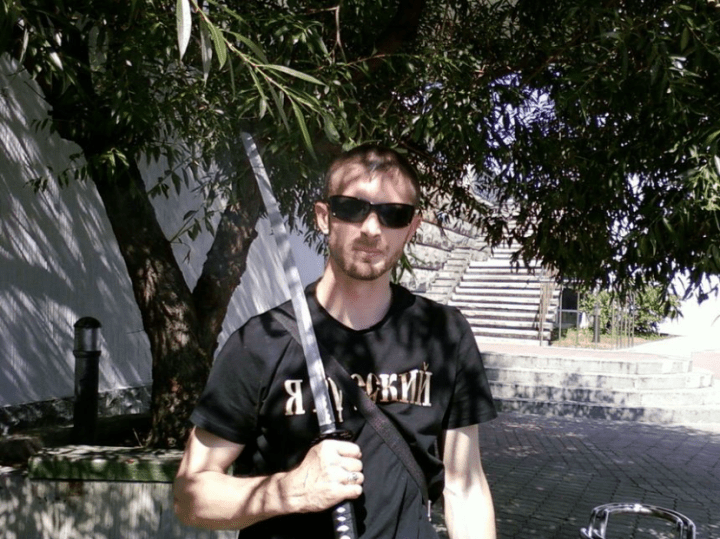
The Insider reported that both Schlund and Kolbasnikova posed as ordinary German citizens giving interviews to the Russian Rossiya-24 TV channel and took part in a propaganda war film “Activists from Germany came to Donbass for truth.”
Spreading propaganda through culture and education
Across Africa, university scholarships are at the center of the Russia House appeal. More than 26 thousand students from African countries applied for budgetary education at Russian universities in the 2024-2025 academic year. The Russian government claims that the number of African students in Russia was 34,000 in 2023, 100% more than the 17,000 students in 2019, according to EU Vs Disinfo .
Foreign students’ education is often funded by major state-owned corporations such as nuclear giant Rosatom, an organization that has contributed to Russia's occupation of Ukrainian nuclear facilities and has been a central player in the Russian nuclear weapons complex.
After graduating, alumni of Russian universities establish “cultural centers” in their home countries and launch other Rossotrudnichestvo projects. “In reality, these initiatives serve as a front for information operations and the promotion of Russian propaganda abroad,” the Centre for Countering Disinformation reported.
Through the “New Generation” presidential program, the Russian House pays for young state officials in African countries to travel to events in Russia promoting themes underplaying Russia’s aggressive foreign policy while portraying the West as hostile to Russia.
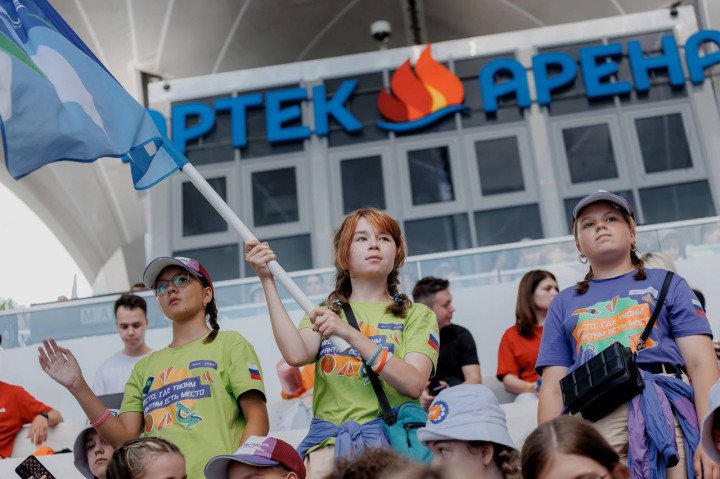
Rossotrudnichestvo runs several youth projects such as “Hello, Russia!” and “New Generation.” The aim of “Hello, Russia!” is to “educate a new generation of Russian compatriots abroad in the spirit of love for Russia.” They take hundreds of “young compatriots” aged 14 to 19, living abroad, on cultural and educational trips to “historical sites of the Russian Federation.”
For example, they frequently travel to Russian-occupied Crimea, visiting sites like the international children's center “Artek” and the site of the Art cluster “Tavrida.”
The Russian House organized an “international film festival” in 21 countries in February 2025.
In Tajikistan and Afghanistan, they screened a documentary titled “Big Ukrainian PR Scam” at a conference dedicated to “Defender of the Fatherland Day. ”
At the Russian House in Tanzania, they screened “Selidovo . Crimes without a statute of limitations.” After watching the film, “the Tanzanians asked a lot of questions about the role of the West in unleashing the conflict” Rossotrudnichestvo claimed.
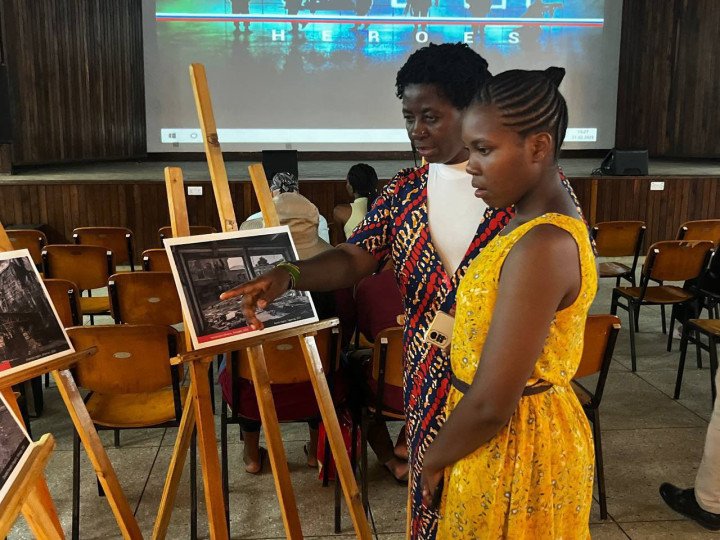
On the eve of “Defender of the Fatherland Day” and the third anniversary of Russia’s full-scale invasion of Ukraine in February 2025, a large-scale international photo exhibition “We accuse!” was launched in Russian Houses around the world. The project was sponsored by Rodion Miroshnik, Ambassador of the Russian Foreign Ministry. “The photo shows the consequences of the crimes of the Kiev regime against civilians in Donbass and other Russian regions” Rossotrudnichestvo reported.
On the third anniversary of Russia’s full-scale invasion, Russian Houses organized a “Z-poets” poetry marathon, reading excerpts from the “Poetry of the Russian Winter” book that includes 27 authors who have been writing frontline poetry since Russia’s initial invasion of Ukraine in 2014.
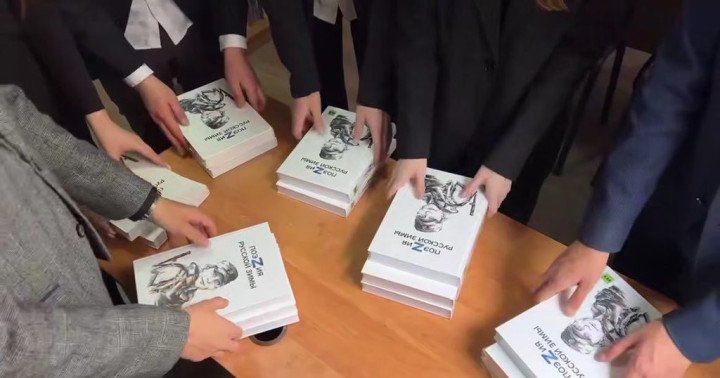
The Russia House in Niamey, the capital of Niger, even produced and released a rap music video celebrating Putin’s birthday.
The list is endless.
Russian House as a mercenary logistics hub
The Russian House in Bangui, the Central African Republic, is run by Dimitri Sytyi, a sanctioned individual who controls the Kremlin-backed mercenary group Wagner Group’s presence in the country. Sytyi uses the Russian House as a logistics hub for Wagner’s gold, diamond, and timber trafficking operations according to African Defense Form (ADF) reports.
Maxim Shugaley, formerly part of Russia’s troll farm known as the Internet Research Agency, and who has close ties to Wagner, visited the Russian House in Niger in 2024 and was later arrested in Chad in September 2024, before a planned visit to the Russian House in N’Djamena. He was released by Chadian authorities and has now returned to Russia, ADF reported.
Moscow’s military school
The RHSC in Berlin is headed by Pavel Izvolsky. It’s the largest arm of Rossotrudnichestvo, costing the Russian taxpayer about $10 million a year according to The Insider.
The Insider found that Izvolsky has previously worked at Rosatom. In his biography, he stated that he was once registered in the officers' dormitory of the Moscow Higher Military Command School (MHMCS). Many MHMCS graduates go on to serve in Russia’s military intelligence agency (GRU) or work as spies for the Foreign Intelligence Service (SVR), specifically in scientific and technical espionage.
Foreign governments alarmed
Politicians in Germany are pushing for the closure of the Russian House, arguing that it serves as an extension of the Kremlin, while suspecting it of aiding Russia to dodge European sanctions. The sanctions placed on Rossotrudnichestvo led to its assets being frozen. Local authorities including Berlin’s prosecutor’s office and the Central Office for Sanctions and Enforcement at Customs, view the funding of Russian House as a criminal matter, according to reports.
Despite sanctions and ongoing investigations, the Russian House in Berlin remains open. Recently, it hosted a screening of the Russian play Legends of the Invalidenstrasse about “the life of old Odesa,” which subtly pushed the narrative that “Odesa is a Russian city” to the German audience, indirectly justifying the war against Ukraine, according to the Centre for Countering Disinformation.
In February 2025, after the wreckage of a Russian UAV fell on the territory of Moldova, authorities decided to close the Russian Center for Science and Culture in Chisinau.
Rossotrudnichestvo branches in Romania and Azerbaijan have also recently been closed, highlighting a potential loss of Russian influence in regions it once sought to dominate, including Eastern Europe.
However, the Russian House continues to establish Moscow's long-term presence worldwide, while deploying vicious propaganda techniques under the cloak of promoting a seemingly positive image of the country. As of February 2025, Rossotrudnichestvo is expanding its programs, content, and educational initiatives, Russian propaganda news agency Sputnik reported. The Kremlin continues to commit atrocities in Ukraine as we enter the third year of Russia’s full-scale invasion, and the fight against political subversion and hybrid warfare continues.
-46f6afa2f66d31ff3df8ea1a8f5524ec.jpg)
-35249c104385ca158fb62273fbd31476.jpg)


-554f0711f15a880af68b2550a739eee4.jpg)



-206008aed5f329e86c52788e3e423f23.jpg)